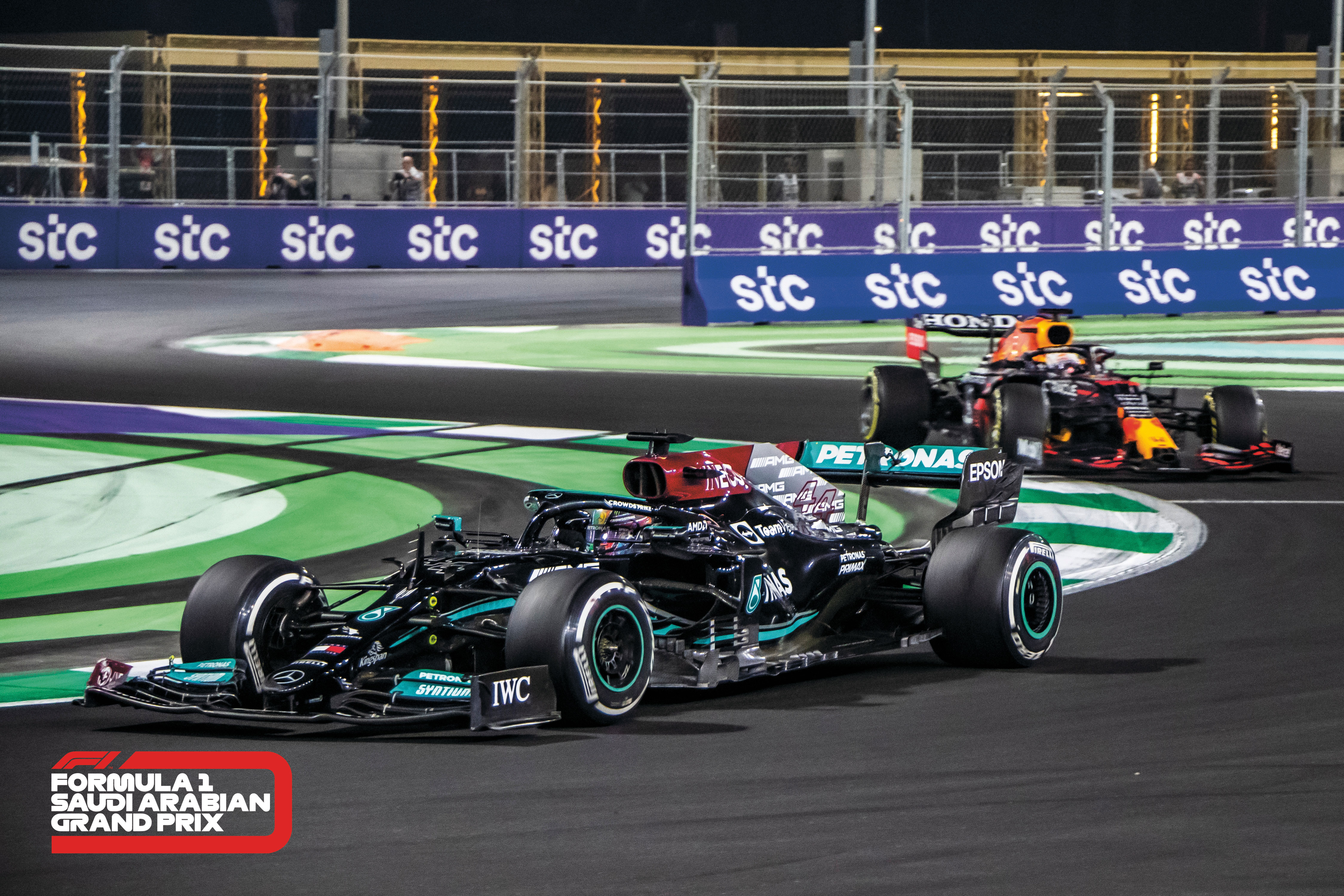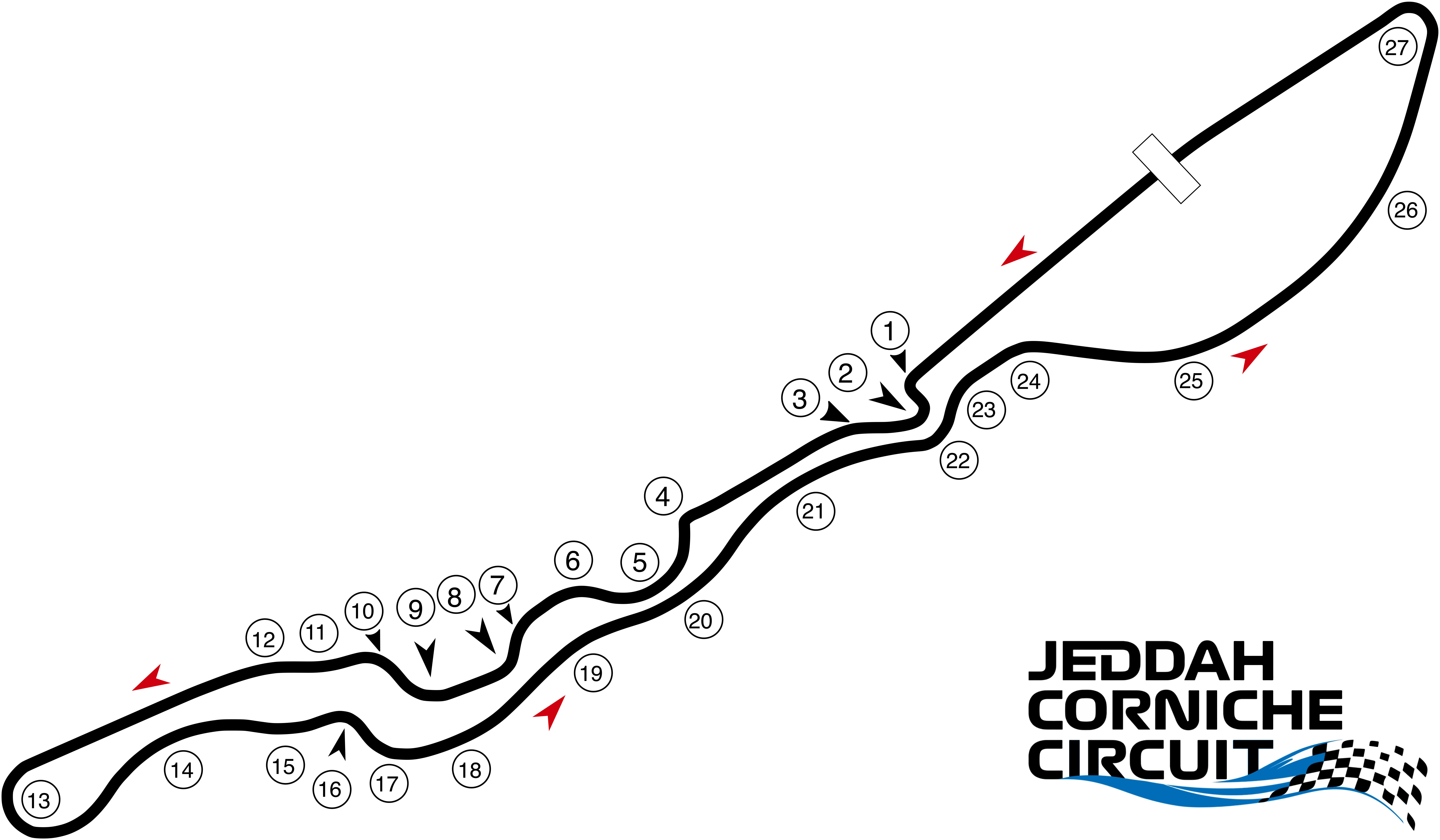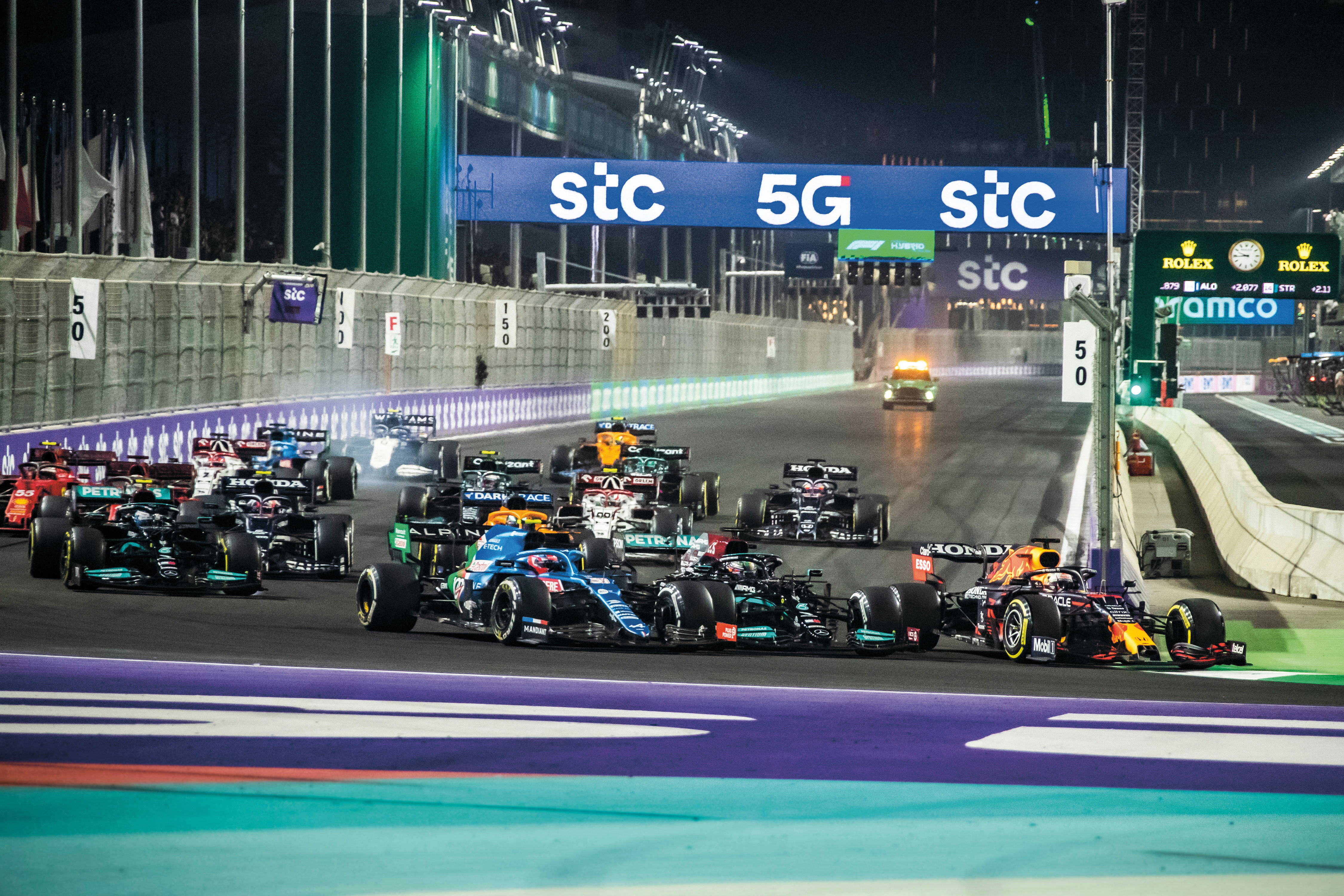Bringing the F1 Grand Prix and Motorsport to the Shores of Saudi Arabia
01 May 2022•
Getting added to the F1 Race Calendar has become a major interest by local and national governments around the world. And it’s no wonder; sports tourism globally is expected to reach over $1.8 trillion USD by 2030, with motorsport being the fastest growing segment in recent years. The motorsport industry is expected to reach a global market size of $8 billion USD by 2026, and 2021 viewership rates have been the largest yet, growing at unprecedented rates with the F1 race series in particular attracting 70 million viewers per race on average. Despite the COVID19 pandemic limiting attendance at the F1 races, a total of 2.69 million fans were welcomed at the 22 races on the 2021 calendar, with some races garnering 400,000 spectators in attendance. The Jeddah Street Circuit was one of two new circuits added to the F1 calendar in 2021.

In August 2019, Saudi Arabia announced plans for a permanent F1 circuit racetrack at their famed Qiddiya entertainment complex being built outside of Riyadh; Qiddiya is a multi-billion dollar mega-project with a masterplan to develop a ‘Capital of Entertainment, Sports and the Arts’. Then in October 2020, the Grand Prix race in Saudi Arabia was included in the first draft of the 2021 Formula One provisional calendar, set to take place on a temporary street-circuit in Jeddah. The track in Jeddah was designed and built inside the better part of a year, with many insiders saying that the actual construction of the site was completed within 7 months. People familiar with the project stated that they had visited the track site in May 2021, and work had only just begun. The speed with which the Jeddah Street Circuit was built is remarkable when we consider the 3,000 on-site collaborators across 50 separate companies required to coordinate the effort. A staggering 600,000 tons of cement, 30,000 square meters of bricks, and more than 1,400 tons of glass were used to develop the circuit.
The street circuit was inaugurated at the Saudi Arabian Grand Prix, which took place on December 5th, 2021. 143,000 fans and spectators attended the event with over 7,500 corporate guests populating the F1 Paddock Club and Premium Hospitality. The race attracted nearly 1 million viewers on television and created interest from abroad from people wanting to attend races in the future and discover the culture, heritage and emerging tourism destinations that the Kingdom has to offer. Pandemic realities reduced the number of foreigners flying-in for the event, and as a result the first Saudi Arabian Grand Prix played out to a sold-out, predominantly local, crowd.
The Jeddah Circuit is being described as the ‘fastest street circuit’ and is the 2nd fastest overall circuit on the F1 2021 Calendar, with average speeds set at 252 km per hour. It is also the 2nd longest track on the circuit (6.174 Km), just behind the Circuit de Spa-Francorchamps in Belgium (7.004 km); and with 27 turns, it has the greatest number of corners, 16 left-hand turns and 11 right-hand turns. The track with the 2nd most corners is the Marina Bay Street Circuit in Singapore, with 23 corners. The race lap record on the Jeddah Street Circuit was set by Lewis Hamilton, at 1:30:734, in the Mercedes W12 2021.
We spoke with Martin Whitaker, the CEO of the Saudi Motorsport Company, a Saudi company newly established in 2021 to lead all commercial and operational aspects of developing the motorsport industry in the Kingdom. Saudi Motorsport Company is a sister-company to the Saudi Automobile & Motorcycle Federation (SAMF), which is the governing body of all motorsports in the Kingdom. HRH Prince Khalid Bin Sultan Al-Abdullah Al-Faisal, is the Chairman of the Saudi Arabian Automobile & Motorcycle Federation, established in 2006. HRH Prince Khalid Bin Sultan Al-Abdullah Al-Faisal has said, “we can now confidently call ourselves a major home to the biggest series in motorsport including Formula One, Formula E, Dakar Rally, and Extreme E and have proven time and again how capable we are at delivering world class events on a global scale. To that end, it is essential that we focus our efforts on taking advantage of this incredible opportunity for the Kingdom via the establishment of the Saudi Motorsport Company, to help us focus our efforts on the consolidation and expansion of motorsport in the country.”

Mr. Whitaker is no stranger to motorsport; he’s had an illustrious 35+ year career in the industry which began as a motorsport journalist in the UK and then as a press officer for the FIA (Fédération Internationale de l’Automobile), before being appointed to various OEM’s Motorsport Programs, such as for Ford and McLaren racing teams, and various F1 management positions. In the Middle East region, he’s best known for his 6 years at the helm of the Bahrain International Circuit, but he’s also led various teams in other motorsports such as the World Rally Championships and the V8 Supercars series. Speaking about the opportunity presented by Saudi Arabia in leading the Saudi Motorsport Company, he said “It was too exciting an opportunity to resist as a motorsport enthusiast”. When asked what exactly excited him most about the role, Whitaker replied, “Saudi has got it right. They presented a clear strategy and ambition to become a major global player in developing the motorsport industry and they are executing on this at breakneck speeds.”
Whitaker explained how the development of the track, though temporary, spared no cost. “You can see the commitment of the Saudi government towards motorsport, as well as to the Saudi people, when you look at the investment made on the temporary circuit. The Saudi government saw this as an opportunity not just to build a great street track for F1, but to develop the entire Jeddah Corniche area and to create a showcase for the Kingdom alongside a vibrant business networking platform.” Development of the area included extensions of the Jeddah Corniche all the way to a new marina. Leisure facilities including more than 18 new restaurants, public bathrooms and outdoor gyms and sporting facilities such as beach volleyball and tennis courts were all added along the walk-way, creating a vibrant corner of the city on the Red Sea coast. Whitaker proudly stated, “Residents of Jeddah and the entire regional community will enjoy the development in this area for many years after the Saudi Arabian Grand Prix moves to its permanent home at Qiddiya in 2023.”
Whitaker also expressed that it wasn’t just about the F1 race, which was exciting in and of itself – but about building a motorsport industry within the country. “What excites me is the larger objectives around motorsport that the Kingdom has in mind. It’s about developing the sport in this country, developing academies and programs for youth that will soon see Saudi Arabia grow their own local motorsport talent from the ground up. And it’s not just about developing local Saudi Arabian motorsport drivers, but an entire industry of technical and commercial teams – from motorsport engineers and mechanics, to team managers, events managers, logistics operators and clerical staff, marshals, coaches, trainers, nutritionists and component suppliers.” We spoke about the industry in the United Kingdom which employs over 50,000 motorsport professionals across the industry, and how Saudi Arabia could one day say the same – and not in the too far distant future.
The Kingdom has also made clear its desires to develop an automotive manufacturing industry in the future. Saudi’s Investment Minister, Khalid al-Falih has said that talks are ongoing with a number of automotive OEMs, and that the Kingdom plans on becoming a country manufacturing ‘cars of the future’. In line with that, Lucid Motors (NASDAQ: LCID), an Electric Vehicle manufacturer looking to challenge Tesla’s market leadership position, announced that it will start building its first manufacturing line in Saudi Arabia before the end of 2022.
The Public Investment Fund (PIF), Saudi’s Sovereign Wealth Fund, is a major investor in Lucid Motors. Bringing automotive manufacturing to the Kingdom while also growing the Saudi Motorsport industry seems to go hand-in-hand, and even more so when we consider Electric Vehicles. The 2022 Dakar Rally, hosted in Saudi Arabia for the 3rd year in a row, saw its first hydrogen truck entry by Gaussin, a French manufacturer of zero emissions vehicles, sponsored by Saudi Aramco. Saudi Arabia also hosts Formula-E’s Diriyah E-Prix and Extreme E’s Desert X Prix which are both electric vehicle racing series. Formula-E’s tagline might say it best: “It’s more than a racing series, it’s a battle for the future.”
Saudi Arabia’s Sports Minister, HRH Prince Abdulaziz Bin Turki al Faisal, has also echoed sentiments that Saudi Arabia was already home to motorsport in the region, and expressed Saudi’s growing appetite for more motorsport in the future: “There is an ambition to expand and develop the motorsports we host, and one we are considering in due course is MotoGP.”
Today, the Saudi Motorsport Company is in its’ infancy, only being a few months old; but already, it employs 85 people, of which over 40% are Saudi women, mostly in managerial roles. On this, Whitaker said, “It’s great for women and girls who are part of this team – they represent a dynamic and growing aspect of our business. From our perspective, it’s also fantastic for the city of Jeddah and its community. The legacy and the sustainability the track will bring to the city will be incredible and wide-reaching.” The Saudi Motorsport Company has ambitious growth plans that are synchronized with the Kingdom’s desire to host global races, but also to grow their own unique local series in the future. The company is already managing many programs such as the e-Karting program for youth (aged 5 to 12 years old), developing academies for two-wheel and four-wheel racers, and are also looking at building various amateur tracks across the Kingdom.
On that, Whitaker said, “It is very clear that the Kingdom sees the motorsport industry as an exciting new segment that will not only attract young Saudis, but also develop them into careers that did not exist 12 months ago.”
“This is only the beginning, and only the start of something much bigger than races. The development of the sport here is a force for good. It’s a great platform for business, sport, young people and community, but it is also about changing perspectives. If the single most important thing this [F1 Grand Prix] race does is change people’s perspective and makes them realize that Saudi is in fact an open country, that people here offer fantastic hospitality, that they’re friendly, and the youth here – which are the majority of the population – are like anywhere else in the world… then that is the ultimate metric from which we can determine our success.”


%2Fuploads%2Fsaudi-tourism%2Fsaudi-tourism-cover.jpg&w=3840&q=75)